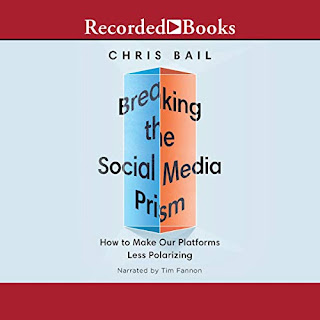Details:
- author: Christopher A. Bail
- full title: Breaking the Social Media Prism: How to Make Our Platforms Less Polarizing
- narrator: Tim Fannon
- genre: nonfiction, sociology
- topics: #socialmedia #echochamber #socialmediaprism #politics
- publisher: Recorded Books
- publish date: 06.04.2021
- timing: 5:43:00
My Rating of the Audiobook:
- content: 💙💙💙.5
- narration: 💙💙💙💙
 |
| Goodreads |
Exerpt from the Book:
If social media platforms are so deleterious to democracy, why not delete our accounts? After all, I might enjoy using carrier pigeons to communicate my latest musings on Justin Bieber. But deleting our accounts is just not realistic. Social media has become so woven into the fabric of our lives - and particularly those of young people - that is here to stay. The good news is this: if we social media users are the main source of political polarisation, this means we also have the power to push back against it.
My Thoughts:
Social behavior on social media is a very interesting topic to me. There is too much politics in this audiobook for my taste, but this is the main focus of this work. At times it was not as engaging as I would like. But I guess the main reason would be the politics theme. The narration was good, but it didn't help much with my engagement. Otherwise, this audiobook is a great study of our social behavior on the internet. The content is interesting enough that I listened to it all, and I would recommend this audiobook. Especially if you are interested in politics and behavior on social media, you will probably like it even more than I did.About the Author:
Chris Bail is Professor of Sociology, Public Policy, and Data Science at Duke University, where he directs the Polarization Lab. A leader in the emerging field of computational social science, Bail's research examines fundamental questions of social psychology, extremism, and political polarization using data from social media and the latest advances in machine learning.
Bail is passionate about building the field of computational social science. He is the Editor of the Oxford University Press Series in Computational Social Science and the Co-Founder of the Summer Institutes in Computational Social Science, which are free training events designed to introduce junior scholars to the field that are held concurrently in a range of universities around the world each year. Chris also serves on the Advisory Council to the National Science Foundation's Social Behavioral and Economic Sciences Directorate, and helped create Duke's Interdisciplinary Data Science Program.





